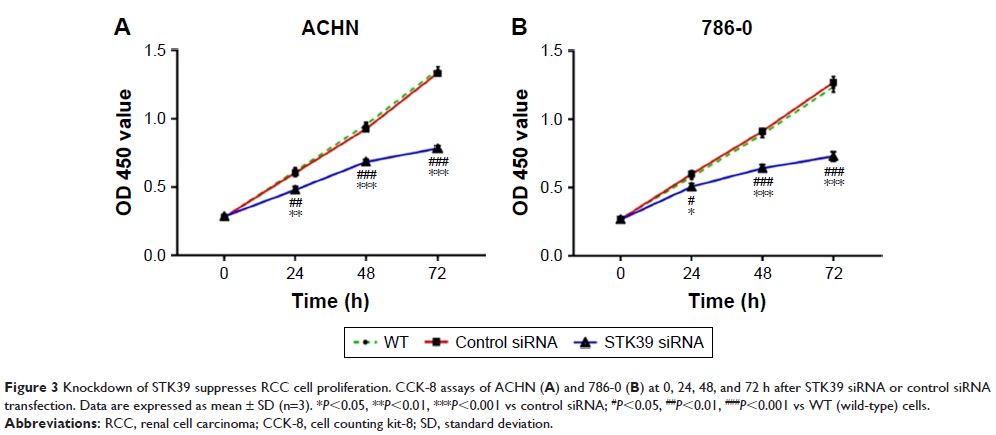108985
论文已发表
注册即可获取德孚的最新动态
IF 收录期刊
- 3.4 Breast Cancer (Dove Med Press)
- 3.2 Clin Epidemiol
- 2.6 Cancer Manag Res
- 2.9 Infect Drug Resist
- 3.7 Clin Interv Aging
- 5.1 Drug Des Dev Ther
- 3.1 Int J Chronic Obstr
- 6.6 Int J Nanomed
- 2.6 Int J Women's Health
- 2.9 Neuropsych Dis Treat
- 2.8 OncoTargets Ther
- 2.0 Patient Prefer Adher
- 2.2 Ther Clin Risk Manag
- 2.5 J Pain Res
- 3.0 Diabet Metab Synd Ob
- 3.2 Psychol Res Behav Ma
- 3.4 Nat Sci Sleep
- 1.8 Pharmgenomics Pers Med
- 2.0 Risk Manag Healthc Policy
- 4.1 J Inflamm Res
- 2.0 Int J Gen Med
- 3.4 J Hepatocell Carcinoma
- 3.0 J Asthma Allergy
- 2.2 Clin Cosmet Investig Dermatol
- 2.4 J Multidiscip Healthc

RNA 干扰对 STK39 的阻断可抑制肾癌细胞的增殖并诱导其凋亡
Authors Zhao Q, Zhu YJ, Liu L, Wang H, Jiang S, Hu X, Guo J
Received 11 October 2017
Accepted for publication 9 December 2017
Published 16 March 2018 Volume 2018:11 Pages 1511—1519
DOI https://doi.org/10.2147/OTT.S153806
Checked for plagiarism Yes
Review by Single-blind
Peer reviewers approved by Dr Akshita Wason
Peer reviewer comments 2
Editor who approved publication: Dr Yao Dai
Aim: Renal
cell carcinoma (RCC), the most frequent type of primary renal malignancies, has
a high mortality rate. Serine/threonine kinase 39 (STK39) is associated with
various human diseases, including cancers. The current study aimed to
investigate the functions of STK39 in RCC.
Materials and
methods: STK39 expression levels in RCC and
paired normal renal tissue samples were detected by real-time polymerase chain
reaction and Western blotting analyses. The biological functions of STK39 were
explored in two RCC cell lines with STK39 silence.
Results: STK39 expression was significantly increased in RCC tissues than
in normal renal tissues. Suppression of STK39 expression in ACHN and 786-0
cells significantly suppressed cell proliferation and induced cell apoptosis.
Consistently, the expression of PCNA and Bcl-2 was remarkably increased, while
the expression of Bax was significantly in STK39 knockdown cells compared to
control cells. Furthermore, gene set enrichment analysis identified STK39 as an
important regulator of p53 and p38 signaling pathways. STK39 knockdown
increased p53 expression and inhibited p38 phosphorylation. Moreover, ectopic
expression of STK39 in ACHN cells resulted in a reduced p53 expression and increased
c-Myc and p-p38 expression. Such effects were suppressed by p38 inhibitor
(SB203580).
Conclusion: STK39 may exert its oncogenic function in RCC through p38
signaling. Our data suggest that STK39 may represent a potential therapeutic
target against RCC.
Keywords: STK39, renal cell carcinoma, apoptosis, p38
